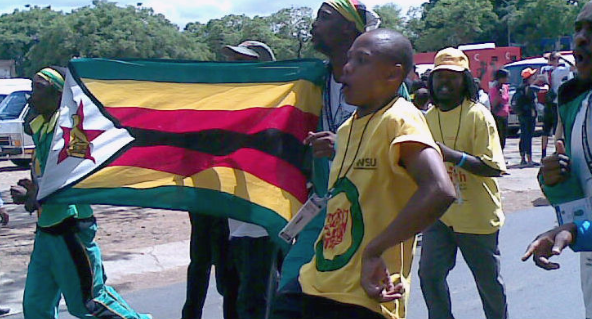There has been much outcry on the situation currently unfolding in Zimbabwe, but what exactly is the cause of the mass arrests taking place in the country?
According to rights groups, Zimbabwe’s military and police are arresting opposition members, activists and journalists following an anti-government protest that was organised for July 30. Thus far, over 60 people have been arrested in the clampdown, and Zimbabwe Lawyers For Human Rights is providing legal aid to those who have been arrested.
Human rights groups have accused President Emmerson Mnangagwa’s administration of arresting those who have dissented under the guise of enforcing anti-COVID-19 lockdown rules.
The MDC Alliance, Zimbabwe’s main opposition party, has said that scores of its officials have been arrested, or have been forced into hiding. According to spokesperson Tendai Biti, state agents have been known to employ fear tactics such as harassing the relatives or vandalising the homes of the person they wish to arrest, if they cannot be found or have gone into hiding.
As reported by The Washington Post, both Zimbabwean police and government officials have denied allegations that human rights have been abused. Instead, it maintains that those who have been arrested by police have incited people to revolt against Mnangagwa’s government.
Investigative journalist Mdudzuzi Mathuthu, who has been a prominent figure reporting on the government’s alleged corruption linked to the purchase of COVID-19 equipment and drugs, has gone into hiding. Amnesty International reported that police arrested his sister and refused to release her until the journalist appeared at Bulawayo Central police station the day before the protests.
Hopewell Chin’ono, also an investigative journalist, has been in jail for the past two weeks after being accused of mobilising foiled protests.
“I am hiding like a rat in my own country for doing nothing more than my job,” Mathuthu said on Monday, August 3. Journalism is just a job, but in Zimbabwe it can be a matter of life and death. They have not only come just after me, but my family as well.”
It is alleged that 22-year-old media student Tawanda Muchehiwa was beaten, tortured and forced to drink his own urine during his abduction last week.
According to Dewa Mavhinga, Human Rights Watch director for Southern Africa, the arrests are “worrying” as some students have been arrested for walking with a Zimbabwean flag in their neighbourhoods or publishing tweets on the country’s political problems.
The situation has given rise to the #ZimbabweanLivesMatter movement on social media, which is being used by thousands to declare they are standing in solidarity against the corruption in the country.
Good morning World. #ZimbabweanLivesMatter pic.twitter.com/XHTYNCnAJx
— Doug Coltart ✊??? (@DougColtart) August 6, 2020
We demand the release of Hopewell Chin’ono and Jacob Ngarivhume today. Journalism is not a crime. Reporting on corruption should not put one in jail, nor should calling for peaceful protests. #ZimbabweanLivesMatter#FreeHopewell #FreeJacob pic.twitter.com/0FE98AxiVb
— Fadzayi Mahere (@advocatemahere) August 6, 2020
8 women went to Harare Hospital expecting to go home with their new-born babies.
Only 1 of them did. 7 babies didn’t make it. All in one night.
I would say imagine the pain of the mothers, but is that even possible?
That’s what we mean when we say #ZimbabweanLivesMatter pic.twitter.com/0qMjjj8geY
— Alex T Magaisa ?? (@Wamagaisa) August 6, 2020
And the people of Zimbabwe? Don’t they deserve our thoughts and prayers??? #ZimbabweanLivesMatter https://t.co/HybmYBSt8z
— Dr. Sithembile Mbete (@sthembete) August 6, 2020
Picture: NPR/Twitter

